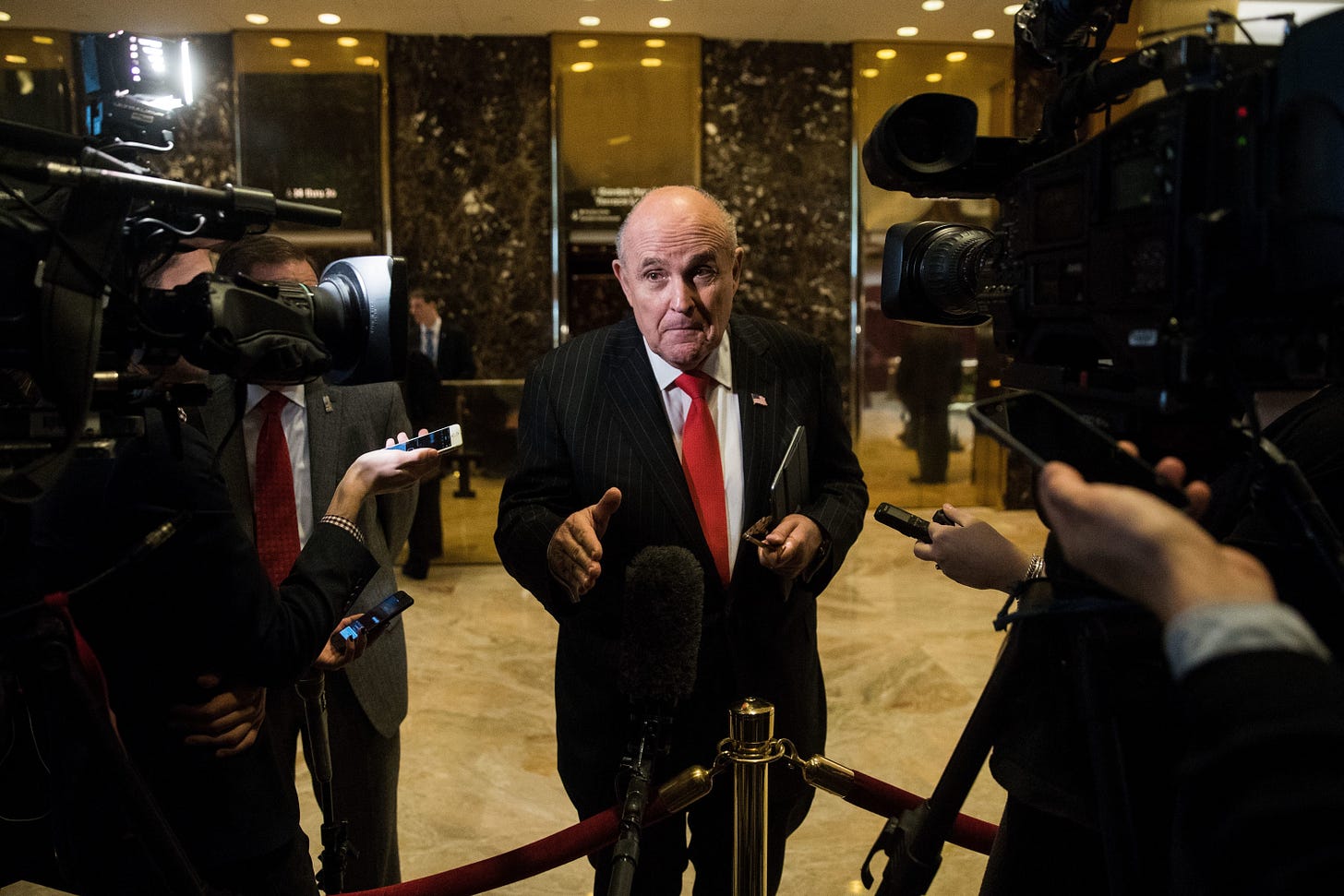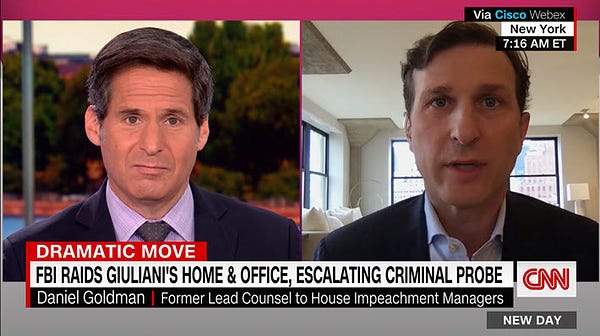Takeaways from the FBI’s Giuliani Raids
His Ukraine machinations are finally getting serious scrutiny, after Trump’s DOJ reportedly stalled the investigation.

Back in October 2019, reports emerged that the Department of Justice was criminally investigating Rudy Giuliani, the personal lawyer and de facto personal diplomat to former President Trump. That news feels old these days, buried amid the debris of constitutional and legal horrors left littering the landscape after the Trumpian era. But with Attorney General Merrick Garland now at the helm of DOJ, the story—and the department—have roared back to life. FBI agents executed a search warrant at Giuliani’s home and office on Wednesday, seizing material that included phones and computers, and at the Washington, D.C.-area home of lawyer Victoria Toensing. Toensing is a former federal prosecutor and Giuliani affiliate who, along with her husband Joseph diGenova, was reportedly involved in collecting information about Joe Biden’s activities in Ukraine from back when he served as vice president. According to the New York Times, the warrants were blocked by senior officials in the Trump Justice Department, but that was lifted shortly after Garland’s confirmation as attorney general.
Of course, this is bad news for Giuliani and for Donald Trump, who is now a private citizen and no longer protected by DOJ’s internal ban on criminal actions against sitting presidents.
The attorney general is not fooling around. Prior to serving on the Court of Appeals for the D.C. Circuit, Garland spearheaded the DOJ investigation into the 1995 Oklahoma City bombing, as well as the conviction of Timothy J. McVeigh. In 2016, he was denied even a hearing on his nomination to the U.S. Supreme Court by then-Senate Majority Leader Mitch McConnell—a snub that might come back to bite the Republican party in the longer run.
Bear in mind that, also this week, the attorney general announced a DOJ investigation into the Louisville, Kentucky Metro Police Department over the shooting of Breonna Taylor. And the day after the murder conviction of former officer Derek Chauvin last week, he revealed that DOJ is looking into whether the Minneapolis police department harbors a “pattern and practice” of illegal activity under federal law. (During the Trump administration, DOJ was sharply criticized for pulling back on civil rights enforcement, and former Attorney General Bill Barr refused to investigate systemic racial discrimination in the Minneapolis police department after George Floyd’s death.)
Predictably, Giuliani’s legal team decried the warrants as “legal thuggery,” glossing over the fact that they were authorized by a federal judge and thus reflect a conclusion that there is probable cause to believe that a crime has been committed and that items connected to the crime were likely to be found in Giuliani’s home and office. Given Giuliani’s attorney status and connection to a former president, the decision to pursue such a warrant was no doubt vetted at the highest levels of DOJ.
Nonetheless, Giuliani, a former New York City mayor, U.S. attorney for the Southern District of New York, and U.S. associate attorney general, lied on Fox News last night when he misstated the standard for a warrant as requiring a showing “that the person is going to destroy the evidence” or “run away with the evidence.” Andrew Feinberg, a top lawyer on Special Counsel Robert Mueller’s team, aptly responded, “This is not how search warrants work.”
The Giuliani probe arose out of the Southern District of New York in connection with the arrests of Lev Parnas and Igor Furman, two former business partners of Giuliani who were indicted on four counts of conspiracy relating to foreign donations in elections and falsifying information to the Federal Election Commission. Their trial is scheduled for October 2021.
According to then-U.S. Attorney Geoffrey S. Berman, Parnas, Furman, and their two alleged co-conspirators “sought political influence not only to advance their own financial interests but to advance the political interests of at least one foreign official—a Ukrainian government official who sought the dismissal of the U.S. ambassador to Ukraine,” Marie Yovanovitch. As the evidence in Trump’s first impeachment proceedings revealed, Giuliani worked to persuade Ukrainian officials to announce an investigation into the Bidens, while peddling the debunked theory that corrupt Ukrainian politicians—not the Russians—interfered in the 2016 election in an effort to help the losing candidate, Hillary Clinton.
Giuliani successfully pushed for the removal of Yovanovitch from her post after she insisted that Giuliani work through official government channels in his communications with Ukraine. According to the Trump White House’s partial transcript of the July 25, 2019 phone call that prompted Trump’s first impeachment, Trump likewise told Ukrainian President Volodymyr Zelensky that Yovanovitch was “bad news.” Moreover, in a recording made during an April 30, 2018, dinner at the Trump International Hotel in D.C. with Parnas and Fruman, Trump can be heard saying “Get rid of her! Get her out tomorrow. I don’t care. Get her out tomorrow. Take her out. OK? Do it.”
Yovanovitch testified at the impeachment proceedings that she had three contacts with Giuliani, adding: “I do not understand Mr. Giuliani’s motives for attacking me, nor can I offer an opinion on whether he believed the allegations he spread about me. Clearly no one at the State Department did.”
Giuliani is reportedly under investigation for potential crimes under the Foreign Agents Registration Act (FARA), which makes it illegal to act as an “agent of a foreign principal” without registering with DOJ. As the DOJ explains on its website, the purpose of FARA is “to identify foreign influence in the United States and address threats to national security” by promoting “transparency” and “ensuring that the United States government and the public know the source of certain information from foreign agents intended to influence American public opinion, policy, and laws.” According to the New York Times, at least one of the Giuliani search warrants explicitly cited FARA.
The Giuliani search warrants appear to comport with the facts leading up to count one of Trump’s first impeachment, which charged Trump with abuse of power in corruptly soliciting election assistance from Ukraine to discredit Joe Biden, his primary rival for the presidency.
It is unclear what sort of information investigators hoped to uncover in Giuliani’s home, although, as Daniel Goldman—a lawyer for the House Democrats in the first Trump impeachment—noted, Giuliani’s electronics might hold a trove of relevant information:


One of the warrants reportedly specified that the FBI sought communications between Giuliani and Ukrainian officials, including former president Petro Poroshenko and two former Ukrainian prosecutors who are implicated in helping Giuliani collect information about the Bidens. Documents made public in November 2019 further indicate that Giuliani was simultaneously negotiating with Ukraine’s former top prosecutor, Yuriy Lutsenko, for hundreds of thousands of dollars in consulting fees to “Giuliani Partners,” purportedly to assist Lutsenko in the recovery of Ukrainian assets. And it’s been reported that Giuliani also sought assistance in his Biden probe from Dmitry Firtash, a Ukrainian oligarch who is under indictment in the United States and whom Toensing (Wednesday’s other warrant recipient) represents.
As happened with the FBI raids targeting former Trump lawyer Michael Cohen in 2018, defense lawyers have claimed—in a statement filled with punctuation, spelling, and capitalization problems—that “the electronics taken are . . . replete with the material covered by the attorney-client privilege and other constitutional privileges.” But as shown in Cohen’s failed bid to claim attorney-client privilege for the bulk of the materials seized from him, that rule is limited. It only protects confidential communications made for the purpose of giving legal advice. Chats with lawyers about other matters are not protected. Notably, the reference by Giuliani’s lawyer to “other constitutional privileges” appears to directly link the materials seized to Trump himself—because Trump is the only client of Giuliani’s who could possibly claim executive privilege for communications made while he was still president.
Much of the Constitution’s fidelity to accountability now rests on Merrick Garland’s shoulders, as the stalemated U.S. Congress flails in the most basic task of investigation and oversight in connection with the deadly Jan. 6 insurrection, among other matters of deep constitutional concern that have arisen in recent years. McConnell’s snubbing of Garland for a seat on the U.S. Supreme Court might, in a strange twist of fate, have resulted in exactly what American democracy needs in this uniquely dire hour.




